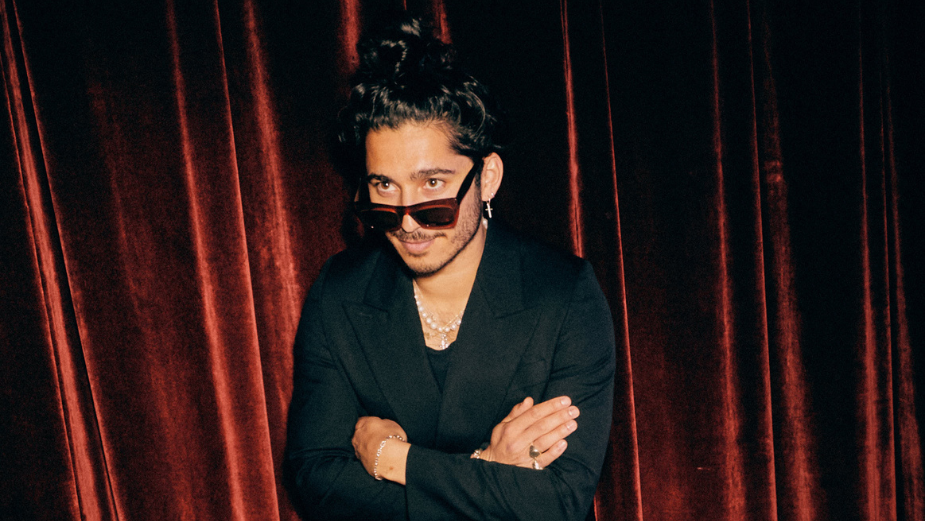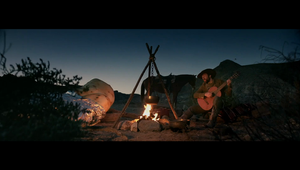
Louis Browne: “It’s About Going Beyond the Veil, and Understanding a Person at their Core”

“Sorry if I keep glancing off”, Louis notes contritely. “It’s just that I watched Jurassic World this morning, and I’m convinced a dinosaur is going to come running over the horizon any second now”.
If that suggests a creative mind with an active imagination, it paints an accurate portrait of the director and photographer Louis Browne (recently signed to STADIUM for US representation). From an early age, he recalls, creating vivid alternate worlds was akin to second nature. “That’s one of the advantages of being an only child which I feel never gets mentioned”, he says. “You do need to create your own fun, to a certain extent. It makes you naturally inquisitive, always looking for fuel and wanting to make connections with people”.
As a result, Louis has ‘learned to live comfortably’ within his own thoughts - a habit which he feels has lent him a creative advantage. “It helps me to be a bit of a chameleon”, he says. “I’ve always been open to other people’s stories, and things I can learn from them. I’ll always say that I’ll happily go for a coffee with anyone, because I’ll come out of it having learned something about whoever I was with, and myself, too”.
In addition to his work in the director’s chair, Louis has built up an impressive photography portfolio working with the likes of Olivia Rodrigo, Gucci, Calvin Klein, and Billie Eilish amongst others. Reflecting on his work in still imagery, he identifies an important moment in his development.
“Unfortunately I lost my Dad when I was a teenager”, he explains. “As a result of that, I tend to view my life in terms of who I was before that moment, and who I became afterwards. My instinct was that I’d taken up photography only after he passed away, sort of in response to it. But I was looking back through pictures of myself as a child recently, and there I was with a polaroid camera in-hand. It’s fascinating the stories you tell about yourself and how they define you - it turns out that photography was something that has always been running through me”.
What’s also fascinating, as Louis goes on to explain, is how his work in photography and the still image informs his work in film as a director. “What’s really helpful about working in photography is the way it teaches you to treat people, and to create a comfortable environment for them”, he says. “It’s all about going beyond the veil, and understanding a person at their core. As a filmmaker, that’s a skill which totally changes the game. You may only have a couple of hours with the people you’re shooting with, so being able to give them that comfort and let them feel like they’re an integral part of the creative process is so important - and great fun, too”.
And, for Louis, one gets the impression that ‘fun’ is a running theme throughout his work.
An Englishman Abroad
Having grown up in the UK before moving stateside, Louis relished the opportunity to throw himself into a country where his accent and reference points might lend him a unique charm. Or, at least, that’s how he saw things happening initially…
“You do wonder if it’s going to be all like Colin in Love Actually, and how you might be this strange and loveable curiosity”, he says. “But when you get here you realise there’s zillions of Brits out here, and you’re rather old news!”.
Nonetheless, the experience of moving abroad has provided Louis with - as he describes it - ‘a helpful conversation starter’. And, on top of that, it’s inspired him to reflect more on his own influences as a filmmaker.
“I’m not sure I’d describe myself as a ‘British filmmaker’ in the most traditional sense”, he says. “I’m sure there’s parts of the industry in Britain that have influenced me on a profound level, and we’re always the sum of our influences. But the truth is that, as for a lot of people in my generation, American art and culture was just as present in my formative years as British stuff”.
As a result, Louis has a keen sense for transatlantic culture which helps him to connect with ideas rooted on either side. “I remember seeing the Dark Knight for the first time as a kid and feeling something I couldn’t describe”, he says, “and I grew up with Kerrang and all these kinds of emo music videos which were massive at the time. There’s a grittiness and authenticity to British filmmaking which is really desirable, but I feel that translates well in the US as well, in particular New York”.
Having now signed on to become part of the team at STADIUM, Louis is ready to dive deeper into American projects. “It’s brilliant to be working with them formally, because the truth is that Eric, Samy, Mike and the whole team have kind of been mentors to me for a little while now”, he says. “They’ve been great for listening and giving helpful advice, even stuff like improving the questions I ask during client pitches on Zoom. It’s the kind of stuff some people might hold back from telling you, but that you need to hear. I’ll always value that input and I can’t wait to keep learning and growing”.
After spending enough time speaking with Louis, one of the most remarkable things one notices is the director’s near-relentlessly positive outlook. No matter the subject, he seems able to approach it with a combination of humility, passion, and excitement. In a world of seemingly endless negative news and anxieties, how exactly does he keep it up?
“Have you ever seen About Time?”, he asks. “There’s a wonderful moment near the end of that film which really made an impact on me. You see Domhnall Gleeson’s character get the maximum enjoyment out of his day when he stops rushing through it, and pauses to enjoy each moment as it happens. It seems trite but it’s true - you’re happier when you’re listening to and interacting with what’s around you, rather than excessively focusing on what’s about to happen later”.
Through About Time and Love Actually, it feels as though Richard Curtis films more generally have made quite an influence on Louis. “Ha, I suppose that’s probably true”, he laughs. “That’s the kind of Britishness I try and aspire to, I guess. It’s big-hearted, welcoming, and positive. It sees the best in people”.
And those influences extend into Louis’ filmmaking, too. “There’s another point here about authenticity which I think those films play so well to, as well. You see films made in the US trying to hit the same note but they can be a little too forced at times. You get the sense in Richard Curtis’ films that it’s real, and it’s come from a place of observation”, he continues. “That’s the Britishness I love - and in a way I think it helps me feel closer to my Dad”.
In truth, Louis’ late father has a profound impact on the director’s work today. “I read once that, when she walks up on stage, Stevie Nicks sort of summons up the memory of her family, or Jimi Hendrix, or Tom Petty”, he says. “It’s as if they’re walking onto the stage with her, giving her energy. I feel that with my Dad, and it helps me with my approach to my own work”.
For such a young director, it’s an incredibly deep way of looking at his career. “It’s simply who I am, it’s in my DNA and it’s what inspires me”, he says. “And, if it’s part of a grieving process, then so be it - it gives me a positive outlook and helps me find happiness in what I do. And I hope it gives other people enjoyment, too”.
It’s a sentiment which reflects a director happy to bring their whole self to their work. And it’s part of the reason why, with all things taken into account, it’s an exciting time to be Louis Browne. And it’s an exciting moment to see what might come next from the filmmaker.















